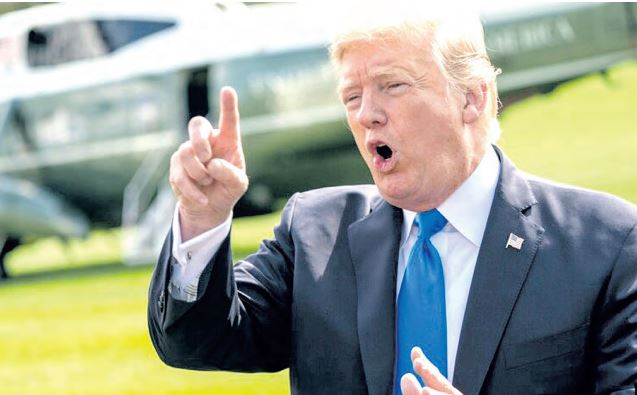

BY CALEB MWAMISI
At its core, realism dictates that nations act to maximise their power and influence while minimising risks to their own security and economy. This philosophy is not unique to any one administration; it has guided the actions of American presidents for more than a century.
Even when the US has championed democracy or humanitarian intervention, a closer analysis often reveals underlying strategic calculations rather than purely moral motivations. During World War II, the United States allied with Joseph Stalin’s Soviet Union, not because it approved of his brutal regime but because defeating Nazi Germany was the greater priority.
In the Cold War, the US engaged in covert interventions, assassinations, and regime changes. It propped up authoritarian leaders in Latin America, Africa, and Asia—so long as they served the broader goal of containing Soviet influence.
The post-Cold War era saw similar patterns whereby American intervention was determined by strategic calculus rather than moral imperatives.
The 1991 Gulf War was fought not to liberate Kuwait, but to ensure that Iraq did not dominate the oil-rich Persian Gulf. It was heavily infl uenced by concerns of regional power dynamics and access to resources.
Even when Barack Obama reduced US military interventions and sought to extricate the country from costly conflicts, he did not abandon realism.
His administration’s calculated engagement in Libya, limited intervention in Syria, and strategic pivot to Asia refl ected a nuanced approach—avoiding full-scale wars while still exerting influence.
American realism, therefore, has never been about isolationism but about choosing engagements selectively, ensuring they align with national interests.
Enter President Donald Trump. While past presidents maintained a balance between realism and global stewardship, Trump has adopted a more direct approach to international relations.
His decision to reduce US foreign aid and gut USAID refl ect a shift in priorities, focusing on maximising immediate, tangible benefits for the United States. In his view, foreign aid should deliver direct returns, aligning with the principle of national self-interest.
Additionally, his calls for NATO allies to contribute more to their own defence and his re-examination of long-standing security agreements highlight a pragmatic approach to diplomacy, emphasising efficiency and short-term gains in the broader context of US strategic interests.
Cutting foreign aid is, on the surface, a textbook realist move. If the primary goal of a state is to protect its own resources and security, then ceasing financial assistance to other nations aligns with this principle.
However, traditional realists argue t this move weakens US infl uence, allowing geopolitical rivals such as China and Russia to step in.
Foreign aid, while costly, has historically been a tool of American statecraft, securing goodwill, access to strategic regions, and leverage over allies. By eliminating it indiscriminately, does Trump risk ceding soft power in critical areas?
The suspension of US support for international security missions has raised questions about Kenya’s continued commitment to Haiti.
While Kenya’s role in stabilising Haiti is both humanitarian and strategic, the real issue is whether it should withdraw simply due to the absence of American funding.
Kenya’s involvement strengthens its position in global security, showcasing its growing diplomatic and military influence and asserting its role as a credible international actor.
Some argue that without US financial backing, Kenya’s role in Haiti may become unsustainable. However, history shows that nations rarely rely on a single benefactor.
The key for Kenya is diversifying its support base. Countries such as Canada, France, and other Caribbean nations have expressed interest in funding, while the African Union and the UN offer logistical and financial assistance. By showing commitment, Kenya strengthens its diplomatic leverage, ensuring that, even without US aid, its leadership is recognised by international partners.
Beyond the immediate financial concern, remaining in Haiti, if sustainable, will provide long-term strategic value as Kenya’s police and military gain essential combat experience in counterinsurgency and urban—skills vital for regional and domestic security.
Additionally, the mission enhances Kenya’s global reputation, giving it a stronger voice in international affairs.
Rwanda’s success in using peacekeeping to raise its diplomatic standing serves as a powerful example of how sustained engagement can yield long-term diplomatic benefits. America, through realism, has always played the long game.
While its foreign policy under Trump may seem erratic, the underlying logic remains: prioritise power, ensure strategic advantages, and avoid commitments that do not serve immediate interests.
The lesson for Kenya and other nations is not to lament this reality but to learn from it. Nations that thrive in the international arena do so by understanding the rules of power, forging diverse alliances, and asserting their own interests with or without external support.
Trump’s America will act in ways that serve its own agenda, just America has done for decades under different administrations.
The real question is whether Kenya—and the world—are prepared to do the same. President Ruto’s focus on domestic tax revenue generation and reduced borrowing was visionary, considering the broader trend of declining foreign aid and the instability that comes with it.
As America pulls back from global commitments, Kenya must follow suit by strengthening its economic sovereignty.
The government's efforts to improve tax collection and reduce dependency on external borrowing show a pragmatic understanding of the realities of global politics—where foreign aid can disappear in an instant.
Kenya has the opportunity to diversify its partnerships and develop a robust, self-sustaining financial model.
This shift will allow Kenya not only to safeguard its national interests but also to assert itself as a growing player in global security affairs—whether or not the US supports it.
By focusing on sustainable
domestic revenue, Kenya can ensure that its future role on the international stage is self-determined,
regardless of the actions of major
powers like the US.

